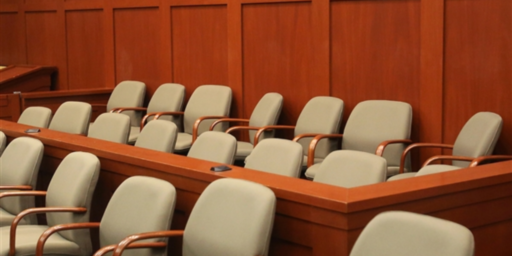Tsarnaev Jurors Were Pro-Death Penalty
The gang at The Week are surprised that "Only jurors who were open to the death penalty were chosen for the Tsarnaev trial."
The gang at The Week are surprised that “Only jurors who were open to the death penalty were chosen for the Tsarnaev trial.”
The New York Times turned up an interesting detail: Only jurors who were “death qualified” — that is, open to the death penalty — were considered for the Tsarnaev trial. Anyone who expressed opposition to the death penalty was disqualified.
This is not in the least surprising. Most if not all jurisdictions that have capital punishment require jurors in death penalty cases to be open to that sentence on the not unreasonable theory that they’ll refuse to vote “guilty” because of their moral objections or simple squeamishness about the punishment.
While the rationale is obvious and unassailable, it’s also problematic. We’ve known at least going back to my high school debating days—over 30 years ago now!—that jurors who are pro-death penalty are more likely to convict than those who aren’t. So, a “death qualified” jury means that the defendant has a more difficult time getting a fair trial.




No, it’s not an interesting detail. In any case in which the death penalty is being sought, the prosecutor will have the right to ask whether a potential juror could impose that sentence based upon the facts proven at trial?
A death qualified jury can be a problem in cases in which the crime is proven by circumstantial evidence, jailhouse snitches, etc. This was a three day trial framed around video of bomb placement.
To me the interesting detail in the NY Times piece is Bostonians feel that federal law has violated local sense of justice.
@PD Shaw, Precisely. In Massachusetts, I think the majority of people do not support capital punishment. So, to have a trial here where the death penalty can be imposed feels wrong.
I was a candidate for a capital punishment jury shortly before I left the South. One of the reasons that I agreed to be willing to impose the death penalty was sort of along the lines mentioned here.
And yeah, I would have done it. It’s the law, whether I agree with it or not, and (a) I wasn’t going to perjure myself and (b) if I wasn’t willing, I’d be replaced my someone willing to do it and more likely to convict.
The prosecutor tried to get me bounced throughout the proceedings, to no success. They had to use a strike on me. Which I was a bit grateful for.
Not that it mattered. It was a rapist and serial killer who was pretty clearly guilty.
@Trumwill: In practice, being pro or and anti-death penalty for jury purposes is not that clear cut. When I worked at an appellate death penalty defender’s office, the first transcript I was given to examine showed that the prosecutor questioned potential jurors in two different ways:
(1) Do you consider yourself religious? Do you believe the death penalty is moral? Could you impose the death penalty?
(2) Will you be able to follow the law per the Judge’s instructions? If after you’ve heard all of the evidence could you comply with the Judge instructions on the legal standards for imposing a death sentence? Could you impose the death penalty?
Rough recollection, but basically one path emphasized religion, morality and personal conviction, while the other emphasized the law, judicial authority and duty.
Oh yeah, the first question was for blacks and the second for whites. But this offensive tactic would only be material if there gray areas in support for use of the death penalty, that blacks can be nudged off the jury and whites held on.
@PD Shaw:
I think you missed Doug’s point. The problem pointed out is not that a “death qualified jury” is the only kind willing to impose the death penalty. It’s that a “death qualified jury” is more likely to find the defendant guilty regardless of whether the case is a death penalty case or not.
Our system is broken. This is yet another example of how the scales of justice are weighted in favor of the government side of any criminal case.
And once again, the passive voice pisses me off.
I’m not a lawyer, but I know enough to know that the process whereby people do or don’t get onto juries in felony cases is complicated. Both the prosecution and the defense have a say. There are “peremptory challenges” and “challenges for cause” and probably others I haven’t heard of.
So what the hell does “only ___ were considered” mean? Does it mean that the prosecution used their challenges to eliminate everyone else? That disapproval of execution was considered adequate grounds for a “challenge for cause”? Something else?
Can anyone give me the actual facts of the case, including the agents involved? Active voice preferred…
@DrDaveT: I am not a lawyer, either, but I was (as mentioned above) a candidate on a death penalty case.
If the prosecution could get me to admit that I would not, under any circumstances, vote for the death penalty, I would have been removed from consideration without the prosecution having to use a strike. So the prosecutors spent almost all of their interactions with me to try to demonstrate to the judge that I would not be willing to vote the death penalty. The prosecution devoted a lot of time to my views on the death penalty, and almost no time to anything else.
They failed, and I was only eliminated afterwards. I assume, though do not know, that the prosecution used a strike on me. This was in the South, where they could probably have used strikes on everyone there against the death penalty and still have had some left over.
@DrDaveT: The prosecutor can challenge for cause a potential juror who categorically opposes the death penalty. The judge rules on whether the questions establish that the juror is “impaired,” i.e. unable to perform the discretionary function required in death penalty cases. Every “death” case is supposed to be evaluated on its individual merits. If a prospective juror states that the good book requires an eye-for-an-eye, and death to those who cause death, then he should be removed for cause as well.
The concern is that by removing this group from the jury pool, the residual is more conservative or law-and-order types. The title to this post though is not accurate; one can be opposed to the death penalty, but still be capable of imposing it.
@PD Shaw: I love the way that you can talk about the points you raise as though they are hypothetical.
@OzarkHillbilly: The scales of justice being weighted toward the government is a feature, not an aberration.
@PD Shaw:
That’s what I was looking for. Thanks.
Boston Marathon runners offers no apology for Tsarnaev briothers after attack.
Free Social Justice Warriors Eddie Ray Routh, Steven Hayes and Joshua Komisarjevsky